
WHO WAS WHO
MONKS
In 1950, during the liquidation of male monasteries and conventions, there were 18 male conventions in Slovakia and one was trying to be established. About 15 percent of all monks, more than 170, were convicted in the following years. These were often drastic punishments after cruel pre-trial detention, in which many monks were tortured, given psychotropic drugs or put under psychological pressure. The conditions of detention or slave labor in camps were similarly inhumane, especially in the Jáchymov and Příbram regions. Religious priests, religious officials or opponents of communism from the ranks of monks were sentenced to long-term sentences. According to statistics, religious under communism in Czechoslovakia were sentenced to 5 life sentences and more than 756 years in prison.
Peter Pavol Gojdič, OSBM (1888 – 1960), Order of St. Basil the Great
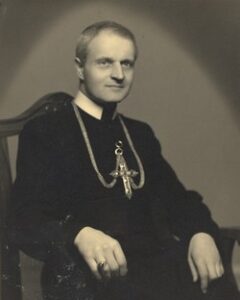
Bishop Peter Pavol Gojdič
The most important modern figure of the Basilian order in Slovakia was Bishop Peter Pavol Gojdič, OSBM. On 27 August 1911, he was ordained a priest in Prešov. In 1919 he became the director of the office of the Greek Catholic Diocese in Prešov. On 20 July 1922, he joined the Order of St. Basil the Great and took the name Paul in the Basilian monastery in Černeč Hora near Mukachevo. On 14 September 1926, he was appointed apostolic administrator of the Prešov eparchy. On 7 March 1927 Gojdič was appointed bishop, and on 25 March 1927 in the church of St. Clement in Rome was consecrated to the titular bishop of Harpas.
Bishop Gojdič established new parishes in places such as Prague, Bratislava, and Levoča. Thanks to him an orphanage was built in Prešov, he founded a Greek Catholic grammar school in Prešov in 1936, and he initiated the creation of the Blahovistnik magazine and the publication of various religious books. On 13 April 1939, he was appointed Apostolic Administrator of the Mukachevo Apostolic Administration in Slovakia. Under the totalitarian conditions of the Slovak state and Slovak Republic, he was appointed bishop of Prešov and on 8 August 1940 installed there. He tried to prevent Jews being deported from Slovakia. On 15 January 1946, he was granted jurisdiction for Greek Catholics throughout the Czechoslovak Republic.
After the communist coup in 1948, Bishop Gojdič rejected the violent enforced conversion of Greek Catholics to Orthodoxy by the communist power. Subsequently, during the communist-staged ‘Prešov Assembly’ on 28 April 1950 the regime liquidated the Greek Catholic Church, and Bishop Pavol Gojdič was arrested and interned. From 11 to 15 January 1951, in a show trial of Bishops Vojtaššák, Buzalka and Gojdič, the latter was sentenced to life imprisonment. With the president’s amnesty in 1953, Bishop Gojdič’s sentence was commuted to 25 years. Bishop Gojdič died on 17 July 1960 in Leopoldov prison hospital and was buried in the prison cemetery in grave number 681. On 29 October 1968, under the regime’s supervision his body was exhumed and transported to Prešov and placed in the crypt at the Greek Catholic Cathedral of St. John the Baptist.
Bishop Gojdič was judicially rehabilitated on 27 September 1990, and on 4 November 2001 Pope John Paul II in Rome declared him blessed. As well as Bishop Gojdič, seven Basilians were illegally imprisoned during the communist regime for a total of seventy-seven years.
Ján Marián Potaš, OSBM (1918 – 2006), Order of St. Basil the Great
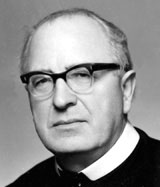
Ján Marián Potaš
Prešov-born Ján Potaš – a faithful follower of Bishop PP Gojdič and his closest collaborator – in 1932 joined the Order of St. John the Baptist Basil the Great in the Basilian Monastery of Černeč Hora near Mukachevo, where he accepted the religious name of Marian and on 1 June 1939 received eternal vows. He was ordained a Greek Catholic priest in 1943 by Bishop Gojdič. In 1944 he was the prefect and then director of the boarding school of the Teacher’s Academy in Prešov, and post-war was also director of the eparchial branch of the Central Charity. During 1945-1948 he studied law at Charles University in Prague.
After the communist coup in 1948 he was detained for six months. In February 1949, during the liquidation of the Prešov monastery of the Basilians by the communists, he was detained and by the end of 1950 had endured several forced labour camps. The regime pressurised him to convert to Orthodoxy, but Potash vehemently held firm.
At the end of 1950, he was imprisoned for ten years as well as supplementary sentences in a show trial. In 1954 he was released on parole from Valdice. He secretly worked with young people, due to which he was re-arrested in 1958 and sentenced to eight years. He was finally released on amnesty in 1960.
After the restoration of the Greek Catholic Church in 1968, he returned from Bohemia to Prešov where he worked as a chaplain, and from 1970 as a Greek Catholic priest in the Vyšný Orlík parish. In 1973, Ján Marián Potaš, OSBM in Brno, was secretly ordained a bishop.
Ján Marián Potaš, OSBM spread the veneration of the Virgin Mary and Bishop Gojdič, OSBM. He was responsible for the exhumation of his remains and their dignified storage in Prešov. J.M. Potash published and distributed extensive samizdat literature, and organized spiritual events during the communist period. He also helped to restore the religious life of the Basilian sisters in Prešov, and secretly raised a new generation of Basilians. He wrote the most wide-ranging publication about Bishop Gojdič, entitled The Gift of Love. From 1970 to 1994, he was the provincial superior of the Order St. Basil the Great in Czechoslovakia, resp. Slovakia. During the communist regime, eight Basilians were illegally imprisoned for a total of seventy-seven years and one for life.
Gejza Lucián Bíró, OSB (1898 – 1990), Order of St. Benedict
Benedictine Gejza Lucián Bíró, OSB was ordained a priest in 1922. During 1922-1939 he worked as a high school professor at Komárno grammar school, 1939-1945 as director of Papa grammar school (Hungary), and 1945-1946 as director of Komárno grammar school and abbot of the town’s Benedictine monastery. During 1946 – 1949, he was the spiritual administrator in Komárno.
In the summer of 1949, the communists liquidated the Benedictine monastery in Komárno, displacing the monks to Kláštor pod Znievom where from 1949-1954 Bíró worked as a parish administrator. During 1954-1970 he was a pastor in Malinová village, then in Baloň and Medveďov, and as a retiree assisted spiritual services in Komárno. From 1949 he was held in disgrace by the communist regime. He wrote several high school textbooks. He founded Hungarian Scouting in Slovakia and edited Katolikus Lapok (Catholic Epistles) magazine. The Benedictines, of whom there were fifteen in Slovakia in 1950, were not imprisoned during communism.
Juraj Aquinas Mária Gabura, OP (1915 – 2019), Order of (brothers) preachers
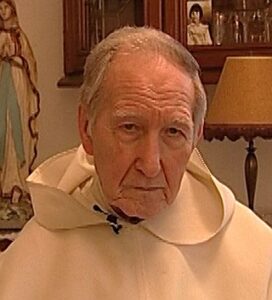
Juraj Aquinas Mária Gabura
Orava-born Juraj Gabura joined the Order of Preachers (the Dominicans) in 1933 and took the religious name Aquinas Mária. He then studied theology and in 1939 was ordained a priest by the Bishop of Olomouc, Leopold Prečan. During 1940-1949 he was administrator of the Dominican Church St. Anna in Trenčín. There he spread the ideas of priest T. Kolakovič, devoted himself to youth, organized camps and spiritual exercises, and co-founded the spiritual magazine Smer (which was banned by the communists in 1948) and the Veritas book edition. He was also an active writer. In 1949 he became head of the Dominican monastery in Košice.
He was not detained during Action K and subsequently went into hiding; but in the summer of 1952 he reported himself to the National Security Corps to protect the family that was providing cover for him. In November 1952 he was first sentenced to life in prison, and in then 1955 his sentence was revised to 25 years. As a result of the amnesty, he was released in 1960 yet remained under State Security Service supervision. He lived as a labourer in Bratislava.
For the next two decades, he secretly served and apostled among the laity as a priest as the so-called “Apostle of Bratislava”. In 1962, he founded the Brotherhood of the Laity of St. Dominic (the “third order of Dominicans”). He also devoted himself to the secret adepts of the order, translating and writing study texts. Secret Dominican communities were formed in Žilina, Zvolen, Košice, Bratislava, and Prešov. In 1978 he was appointed secret superior of the Slovak Vicariate of the Czech Dominican Province.
Father Aquinas significantly contributed to physical and spiritual survival, and after November 1989 to the restoration of the Dominican order in Slovakia. He is buried in Zvolen. Together with Father Aquinas, two other Dominicans were convicted for a total of 49 years.
Polykarp Alojz Minárik, OFM (1914 – 1992), Order of Lesser Brothers
He joined the Order of Lesser Brothers (Franciscans) in 1931, and took his eternal vows in 1938. He studied theology in Bratislava, and in Rome at the Collegio di San Antonio. After his ordination on 23 March 1940 in the Lateran Basilica in Rome, he worked at the Franciscan monastery in Žilina. In 1944 he was awarded a licentiate of philosophy and sacred theology. In September 1947 he was detained due to activities in the Family Group. The State Court in Bratislava sentenced him to three years during the “Minárik, et al.” show trial in 1950. The Supreme Court in Prague increased his sentence to six years on appeal. He was imprisoned in Leopoldov, Ilava, and Plzeň-Bory, and put to hard labour at Jáchymov and Handlová mines. He only became chaplain in Bratislava-Petržalka in 1966. In 1981 he retired to the Charity Home in Pezinok, where he died on 1 May 1992.
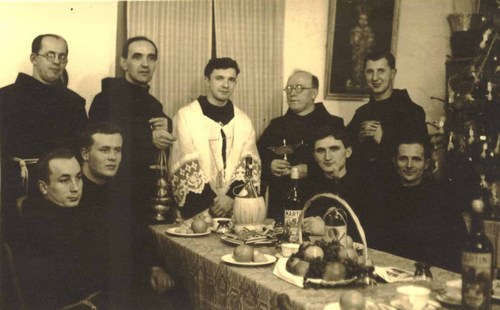
Christmas of Slovak OFM family in Rome 6.1.1941. Polykarp Minárik is sitting first from the left (foto: frantiskani.sk)
Father Minárik devoted himself to philosophy, wrote several studies, and published in the magazine Františkánsky obzor (Franciscan Horizon). During communism, eight Franciscans were illegally imprisoned for a total of 34 years.
Fidél Ambróz Jurčovič, OFM (1916 – 2004), Order of Lesser Brothers

Fidél Ambróz Jurčovič (foto: frantiskani.sk)
In 1931 he joined the religious novitiate in Trnava, and adopted the religious name Fidél. From September 1936 he studied philosophy and theology in Salzburg, then transferred to the Faculty of Theology in Bratislava for three years, then studied at the Pontifical Antonianum University in Rome. He accepted eternal religious vows on 29 June 1938 in Bratislava. He was ordained a priest on White Saturday, 23 March 1940, in the Lateran Basilica in Rome. He continued theological studies in Rome, graduating with a degree in theology in March 1943. Upon his return, he lectured on liturgy and the Bible at the Franciscan Theological School in Žilina almost until the monasteries were closed in 1950 – with a break only in the autumn of 1947 when imprisoned.
But on 10 March 1950, Father Jurčovič was sentenced at a show trial “for conspiracy against the republic” to two years imprisonment. Upon appeal the Supreme Court in Prague further sentenced him to three years. He served his sentence at a mine in Handlová, from 1951 in camps in the Jáchymov region, and from 1952 he was interned at concentration monasteries in Osek and Králiky until release in 1955.
Until 1970 he worked as a worker, and filing clerk, where he could secretly reproduce religious literature. In 1968 he joined the revival of the Franciscan order in Czechoslovakia, when the wrongs caused by the liquidation of monasteries and orders from 1950 were partially atoned for. During a visit to Franciscan headquarters in Rome, Father Fidél spoke about their situation in Slovakia. In 1969 he was appointed Provincial of the Franciscan Order in Slovakia. In the period of Church oppression during “normalization”, he worked as an accountant and also privately or secretly conducted Mass. After November 1989, he was confirmed provincial for another three years. In 1991, he participated in the General Chapter in the USA as the oldest provincial of the OFM in terms of age and years of service. During communism, eight Franciscans were illegally imprisoned for a total of 34 years.
Augustín Krajčík, CSsR (1914 – 1979), Congregation of the Most Holy Savior
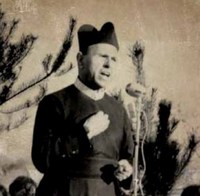
Augustín Krajčík (foto: podolinec.eu)
Veľké Dvorany-born, he took religious vows in České Budějovice in 1933, was ordained in Prague in 1940, and worked as a priest in Bratislava. In 1942 he became a provincial of the congregation (Redemptorists). During the war, he was editor-in-chief of Vestník Združenia sv. Jozefa, and during 1944-1969 edited Životom magazine and contributed to Kultúra.
During 1945-1950 he worked spiritually at Podolínec monastry, and led its post-war repair. The communist regime took it over during the Action K liquidation of monasteries in 1950. He was interned in Pezinok, Báč, and again Podolínec. This was followed by a decade-long painful pilgrimage through labor camps in Nováky, Ústí nad Oravou, and Ostrov nad Ohří, and the prisons of Pankrác in Prague and Mírov. Only in 1968 did he return as chaplain in Podolínec. In 1971, the normalization regime withdrew his state approval, yet Father Krajčík secretly continued to form young Redemptorists. He died of a stroke aged 65.
Under communism, Redemptorists were imprisoned for a total of 42 years.
Ján Ivan Mastiliak (Mastyľak), CSsR (1911 – 1989), Congregation of the Most Holy Savior - Eastern Province
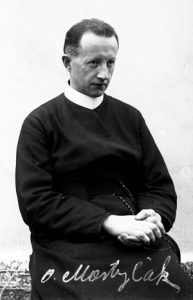
Ján Ivan Mastiliak
In 1922 he began studying in the juvenile congregation (Redemptorists) in Hlučín, Moravia. In 1928 he became a novice of the Redemptorists of the Eastern Rite in Stropkov. After taking religious vows on 2 August 1929, he studied at the priestly seminary in Obořiště, near Dobříš. He was ordained a priest on 12 August 1934 in Užhorod. In 1935 he graduated in Obořišť, and from 25 July worked at the monastery in Michalovce for a short period. From 1937 to 1941 he studied in Rome at the Gregorian University and at the Pontifical Eastern Institute, where he was awarded a doctorate in philosophy and theology and went on to be a resident lecturer. Returning to Slovakia in 1944, a year later he began lecturing at Obořiště seminar. He acted as a bi-ritual priest.
In March 1950 at the vindictive show trial of figures from religious and ecclesiastical institutions (“the trial of Augustín Machalka, et al.”), he was sentenced to life imprisonment for alleged espionage. He served his time at several prisons. The communist regime reduced his imprisonment to 25 years, and in 1965 he was released on parole. He became a priest-worker. In 1968, he joined the restoration of the Greek Catholic Church (which had been abolished by the communists in Czechoslovakia in 1950). He became the head of the Michalovce vice-province of the Redemptorists, and devoted himself to the secret upbringing of priestly youth. His mastery of an impressive 14 languages enabled him to translate spiritual literature, which was then disseminated via samizdat. He translated the Code of Eastern Canon Law, and about 140 religious works into Slovak. He died on the eve of communism’s fall in Slovakia. In January 2015, the beatification process of Father Mastiliak began. As well as Mastiliak, eight more Eastern Redemptorists were convicted under communism.
Vojtech Bošanský, SVD (1913 – 2001), Society of the Divine Word
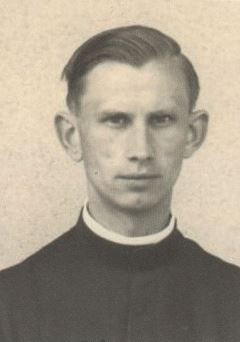
Vojtech Bošanský (foto: knihydominikani.sk)
He graduated from Nitra grammar school in 1932. Upon entering the novitiate in Mödling, Austria, on 1 May 1934 he took his first religious vows. There he graduated in philosophy and studied theology at the Gregorian University in Rome. He was then ordained a priest on 30 October 1938, and had a primacy in Bánovce nad Bebravou on 23 July 1939. From September 1939 he taught at the religious grammar school at the Mission House of the Society of the Divine Word (the Verbists) in Nitra. He later taught religion at this city’s state grammar school. From 1947 he was rector of Nitra’s Mission House and on 3 October 1948 was elected provincial of the Society of the Divine Word in Slovakia.
Due to pressure exerted by the communist regime, Verbist church dormitories were abolished in January 1949. In the subsequent Action K, the communists liquidated Verbist monasteries and mission houses in Spišský Štiavnik, Vidina, Calvary and Zobor (Nitra), and interned monks at Podolínec. Provincial Vojtech Bošanský was eventually transported to the internment monastery in Králiky, northern Moravia, where he was forced to work in forestry until the end of 1960.
After his release, Father Vojtech Bošanský worked at State Property in Bánovce nad Bebravou, but in February 1961 was arrested and imprisoned in Košice. State Security orchestrated the “Vojtech Bošanský et al.” show trial against the Verbist order. Fourteen Verbists were indicted and then convicted in July 1961 at Košice Regional Court. Provincial Vojtech Bošanský received fourteen years’ imprisonment, yet was released in late 1968. From 1972 he lived as a retiree at Bánovce nad Bebravou and then the Mission House of the Mother of God in Nitra, and was the spiritual father of canonist sisters in Beckov. He is buried with his confreres at Nitra cemetery.
During the communist period, fourteen Verbists were sentenced to a total of 96 years. All were rehabilitated in January 1991.
Jozef Škoda, SVD (1913 – 1998), Society of the Divine Word
He studied at the grammar school of the mission house of the Society of the Divine Word (Verbist) in Močenok and Nitra, and graduated in 1934. He then studied philosophy and theology at the Verbist Missionary House in Mödling, Austria, where he entered the novitiate. In 1940 he was ordained a priest. Despite his wish for missionary work, he began teaching at a religious grammar school in Nitra. During his one-year break, he completed theological studies in Vienna. He taught in Nitra until 1950 when the violent Action K led to Father Škoda’s internment in Báč, Podolínec, Želiv (Czech Republic), and finally Králiky.
He was released in 1959. He started working in agriculture, but in 1960 was arrested. He was imprisoned for 11 years for alleged high treason during the “Bošanský, et al” show trial. He served his sentence at Valdice. In 1968 he was released on amnesty. He worked as a spiritual father of nurses in Jindřichovice (Czech Republic), then with the Vincentians in Hronovce (Slovakia) – the latter institute was abolished by the communists in 1985. Father Škoda then worked for the nuns at Kláštor pod Znievom until his death in 1998. Together with the other confreres, the Verbists were imprisoned for a total of 96 years.
Vojtech Rudolf Rajner, OFMCap (1919 – 1999), Order of Friors Minor Capuchin
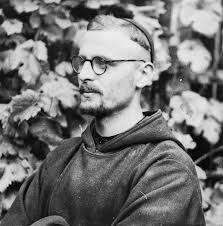
Vojtech Rudolf Rajner
Capuchin Father Vojtech – as he came to be known – was born in Pezinok. He graduated from grammar school in Bratislava in 1938, and joined the novitiate Order of Friars Minor Capuchin. In 1944 he became guardian of the Capuchin monastery in Pezinok. During the communist’s liquidation of monasteries during Action K, he left the monastery to work in service of the church. But from 1952 he was interned at Králiky for three years, before working as a labourer in Bratislava for five years. In 1961, he was sentenced to 14 years in prison in the show trial “Rudolf Rajner, et al.” of the Capuchin. He served nine years, during which he cared for fellow prisoner Titus Zeman. He was the last monk to be released from prison in 1968. Although he received state approval for pastoral work in 1979, he could not work in his monastery church until 1989. He was an ardent confessor until his death.
All Capuchins in Slovakia were sentenced under communism to a total of over 70 years in prison.
Štefan Krištín, CM (1909 – 2005), Missionary Society of St. Vincent de Paul
After graduating from high school, he continued to study theology in Banská Bystrica and Graz. In 1936 he became the spiritual administrator of the Mission House of the Society of St. Vincent de Paul, (Lazarist, Vincentians), in Ladce, and subsequently the spiritual administrator of the Apostolic School in Banská Bystrica. In 1950 during the liquidation of religious orders by the communists, he was interned at Svätý Beňadik monastery yet managed to escape. Shortly afterwards, he founded a “secret seminar” of Lazarists in Nitra to school future priests. But in October 1951 this seminar was uncovered by the ŠtB, and four Lazarists were taken into vengeful custody. The show trial took place in February 1953 in Nitra. Krištín and associates were accused of forming an illegal group, and subsequently convicted of high treason with life imprisonment. On appeal, the sentence was commuted to 20 years served at prisons in Nitra, Bratislava, Ilava, Mírov, Leopoldov, and Valdice in Jičín. He was then put to work at a camp in Jáchymov, where prisoners-priests processed uranium ore. After 13 years, he was released due to poor health. He then worked as a labourer, before becoming the spiritual administrator of the Charity Home in Pezinok. He died at the Provincial House of Lazarists in Bratislava.
In addition to Father Krištín’s life sentence (reduced to 20 years), under communism other Lazarists were imprisoned to a total of 121 years with sentences ranging from five to 18 years.
Cardinal Ján Chryzostom Korec, SJ (1924 – 2015), Society of Jesus

Cardinal Ján Chryzostom Korec (foto: kbs.sk)
At the age of 15, he joined the Society of Jesus (the Jesuit order) in Ružomberok. He graduated from Kláštor pod Znievom grammar school in 1944. From 1944 to 1950 he studied philosophy and theology in Trnava and Brno. In Trnava, he worked on the editorial staff of Posol and Katolícke misie magazines.
During the communist-led liquidation of monasteries in Action K, Ján Korec was interned at monasteries in Jasov, Podolínec and Pezinok. After his release in September 1950, Bishop Pobožný of Rožňava secretly ordained him a priest on 1 October 1950. He held various various civilian and blue-collar jobs. The Church face a critical situation following the internment of bishops in Slovakia, so by a decision of the superiors, Priest Ján Korec was secretly ordained a bishop by Bishop Pavel Hnilica on 24 August 1951.
He continued to work in various civilian jobs, from which he was repeatedly moved on. He also worked as a secret bishop and devoted himself spiritually to undergraduate youth. After the persecution gained pace, Bishop Korec secretly ordained Dominic Kalata as bishop. Bishop Korec was under State Security surveillance until his arrest in March 1961. In May, Ján Korec et al. were sentenced to 12 years’ imprisonment at a show trial. He was imprisoned and kept in solitary confinement in Prague (Pankrác) and Valdice. At prison he met other convicted priests, monks, and lay people. He was released in February 1968. During the eight-year confinement his health had deteriorated, and upon release he was treated for tuberculosis. In 1969 he was judicially rehabilitated and attended Rome, where Pope Paul VI. presented him with an episcopal insignia.
Upon his return, Bishop Korec acted as a clergyman, but in 1974 his state approval for priestly service was revoked. He was again put under State Security surveillance, worked as a civilian, and took invalid retirement in 1982. He nevertheless continued to work with clergy and youth, and produced religious and historical writing. He wrote cca 70 samizdat works as part of the Library of Faith, which have also been published abroad (Canada, Italy, Austria, Poland, etc.). His writings and books developed the ideal of priestly service, confronted communist ideology, and supported the persecuted church in Slovakia. Between 1981 and 1989, Bishop Korec published several books and studies on pastoral theology, Christian history, and philosophy. In 1986, the University of Indiana (USA) awarded Bishop Korec an honorary doctorate in law. Following the Candle Demonstration in March 1988, pilgrimages, and his criticism of the media’s atheistic stance, the ŠtB interrogated and persecuted Bishop Korec.
After November 1989, Bishop Korec became the rector of the CMBF seminar in Bratislava. In February 1990, Pope John Paul II appointed him Bishop of the Diocese of Nitra, and in May 1991 appointed him a cardinal. Cardinal Korec received academic and state awards both internationally and in Slovakia in recognition of his support for human rights and religious freedoms.
Ján Srna, SJ (1909 – 1984), Society of Jesus
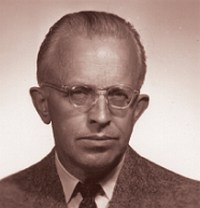
Ján Srna
During his high school studies in Ružomberok (1924 – 1926) he was an inmate of boarding school Stanislavov belonging to the Society of Jesus (the Order of the Jesuits). Srna joined the Jesuit novitiate in 1926 in Trnava, and studied philosophy in the Netherlands and theology in Belgium (1931-1937) before being ordained a priest in Louvain (1937). After several positions in Slovakia, he became the administrator of a small bishop’s seminary in Levoča (1940-1942). He devoted himself to youth, organized Marian congregations, and wrote for the monthly Posol Božského Srdca Ježišovho (Messenger of the Divine Heart of Jesus). He was the last editor of Stanislavovské zvesti magazine (1945 – 1948). From 1942 he was the secretary of the Jesuit provincial in Slovakia, and from 1946 provincial of the Society of Jesus in Slovakia. Despite communist persecution, Srna held this exposed position for 31 years.
During the “Night of the Barbarians” (liquidation of monasteries during Action K), he was interned separately from his confreres at Capuchin monastery in Pezinok. In 1956, he received a maximum 12-year sentence during a show trial with ten other Jesuits. Upon release he worked as a labourer, and in 1969 welcomed to Slovakia the Jesuit order of Pedro Arrupe. Due to deteriorating health, he handed over the office to the provincial in 1977. Yet the communists forbade him from seeing out his days at a charity home for priests.
During communism, the Jesuits were tried both in groups and individually: František Paňák, SJ in 1954 was sentenced to over six years in prison. Ten Jesuits led by Provincial Ján Srna SJ were sentenced to between one and twelve years in 1956, with Provincial Srna to 12 years. Five Jesuits led by the secret bishop Ján Korec, SJ in 1960 were sentenced to a total of over 25 years – with terms ranging from between three to Korec’s twelve years. Secret Bishop Dominik Kaľata, SJ in 1963 was sentenced to four years. Alojz Litva, SJ’s nine-year internment was followed by over seven years in prison.
Andrej Dermek, SDB (1914 – 2003), Don Bosco Society
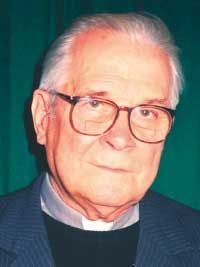
Andrej Dermek
In 1937, he graduated from Malacky grammar school, and a year later completed pedagogical practice at Salesian institutes in Šaštín and Trnava. From 1938 he began to study theology at the Pontifical Gregorian University in Rome, and in 1940 moved to Bratislava where he graduated and was immediately ordained a priest in 1942. There in 1945 he received a doctorate in pastoral theology, and his dissertation elaborated on the educational work of Don Bosco. He then began lecturing in the Holy Scriptures at the Salesian Theological School in Svätý Kríž nad Hronom.
During Action K in 1950, he was interned at Podolínec yet managed to escape and then organized the escapes of Salesian clerics abroad. But in 1951 while trying to get Zeman across the border, he was detained, harshly interrogated, and in 1952 in the “Titus Zeman et al.” show trial was sentenced to 14 years in prison (see T. Zeman article). He was imprisoned in Ilava in 1960, yet released on amnesty. He then worked as a labourer and clerk.
Andrej Dermek worked diligently for the secret church in the education of young Salesian candidates for the priesthood. From 1968 to 1984, Don Dermek was a provincial of the Salesians in Slovakia, working with lay people and families. After November 1989, he lectured at the CMBF in Bratislava. In 1997, he was appointed Professor of New Testament Biblical Studies. During the communist regime, he published several samizdat works such as Chlieb a slovo (Bread and the Word), Pán sa pýta (The Lord Asks), The Rosary in Our Hands (Ruženec v našich rukách) with E. Macák, and several shorter works, published many studies, contributed to Catholic newspapers, and prepared three theological works for printing.
Salesians were sentenced to a total of almost 190 years in prison under communism.
Titus Zeman, SDB (1915 – 1969), Don Bosco Society
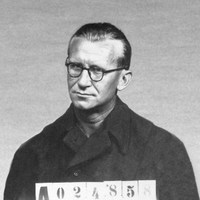
Titus Zeman (foto: tituszeman.sk)
Vajnory-born, he studied at a grammar school in Bratislava and then the Salesian grammar school in Šaštín. In 1935 he graduated from Kláštor pod Znievom. In 1931 he joined the Salesian order in Svätý Beňadik – the Society of Don Bosco. After graduating, he worked as a teacher and in 1937 studied theology at Pontifical Gregorian University, completing studies in Chieri, Italy. In June 1940, Cardinal M. Fossati ordained him a priest. Subsequently, he became the school principal at the diocesan seminary in Trnava.
Being interested in natural sciences, in 1940 Zeman also studied at the Faculty of Science of Slovak University in Bratislava. After graduating, he taught natural sciences and was a catechist at the Bishop’s Grammar School in Trnava.
From 1949 to 1951, Alfonz Paulen was the chaplain in Šenkvice, where the future prisoner and victim of the communist regime was the pastor. Here Titus Zeman began to organize the escapes of monks and theologians to Turin, Italy, where Salesians were headquartered. During two such operations, he got at least 50 adepts to Turin. But during Zeman’s third operation in the spring of 1951, he and the would-be escapees were detained by the Border Guard. At the “Titus Zeman et al.” show trial in 1952 they were sentenced to a total of 285 years in prison, and Zeman to 25 years for “high treason and espionage”.
He spent 13 trying years at Ilava, Mírov, and Leopoldov prisons, and at the Jáchymov uranium ore mining camp. He was released due to poor health, and subsequently worked as a stockman. He died in 1969 as a result of imprisonment and fear of its possible continuation. In 2017, Titus Zeman, SDB in Bratislava, was beatified.
Salesians were sentenced to a total of almost 190 years in prison under communism.
Anton Kamil Vančo, CCG (1909 – 2000), Congregation of the Brothers Comforters of Gethsemane
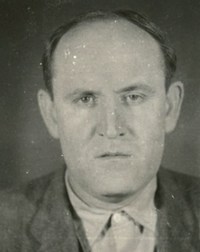
Anton Kamil Vančo after he arrest by State Security Service (foto: A ÚPN)
Hlohovec-born, he studied at the Comenius Grammar School in Vienna before graduating at the University of Vienna, and then taught history and natural sciences. In Vienna, he entered the convent of the Congregation of the Brothers Comforters (Divine Heart of Jesus) of Gethsemane (Comforter), where he took the religious name Kamil. He later returned to the Czechoslovak Republic and studied theology at the priestly seminary in Trnava. He continued studies in České Budějovice, where he was ordained in June 1939 as a religious priest of the Comforters of the Divine Heart. He worked as a priest in Suché Vrbné and Nepomuk, and taught religion at České Budějovice grammar school. There he founded the student underground cell Levíček against Nazism and Communism.
From 1943 he was a pastor in Sokolovce in Slovakia, where even after February 1948 he spoke out against communist power and condemned the pro-regime “Catholic action”. Through Slovak comforters in Marianka, he made contact with his confreres in Vienna and helped emigrants. In April 1952 he was arrested by the State Security Service, and in 1953 sentenced to life imprisonment. In 1955 an amnesty reduced his sentence to 25 years. In 1964 he was released on parole, but with lasting health problems due to interrogation and imprisonment. After his release, he assisted as a priest around his birthplace. He died in the convent ‘s religious house in Bratislava in 2000.
Comforters were also imprisoned in the 1960s, being sentenced to over 30 years.
Andrej Gerát (1891 – 1954), Catholic priest
The order of Salvatorians had tried to settle in Slovakia since 1948, and the priest Andrej Gerát – at that time the spiritual of the Salvatorian nuns in Dolný Smokovec – was to provide information about the order. Gerát was a supporter of the priest and politician Andrej Hlinka, and an opponent of communism. In 1949, he also opposed the schismatic Catholic Action, as a result of which the communist authorities had accused him of sedition. In 1950, at the age of 59, he was sentenced to 11 years in prison. While serving his sentence at Mírov Prison, he was transferred to Brno prison hospital due to ill health brought about by difficult prison conditions and untreated diabetes. He died in 1954. The communist regime buried him in an unmarked grave in Brno. Family members could not attend the funeral. Even in 1968 the regime forbade a memorial plaque at his birthplace. He was not rehabilitated until 1990.
NUNS
Sister Justina - Terézia Tuková (1922 - 2019), Congregation of the Sisters of the Divine Saviour
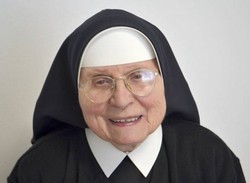
Sestra Justína – Mária Tuková
Her service at Prešov hospital was disrupted by Soviet bombing on 20 December 1944. In 1950, she met the Priest Štefan Sninčák in Prešov. He later emigrated to the USA and sent her a letter asking to help other priests.
In February 1954, Sister Justina was arrested by investigators. The official reason was communication with Priest Štefan Sninčák. The ‘evidence’ presented against Sister Justina was a forged foreign agent’s briefcase containing meeting minutes with Sister Justina. She was then sentenced to 10 years imprisonment following a trial. After an amnesty issued by President Novotný, she was released from prison on 13 May 1960 and sent home. Only later could she return to the monastery to her fellow sisters in Slovenská Ľupča, but she was forbidden from appearing in public in her habit.
She spent the next seventeen years in the former Premonstratensian monastery in Jasov, which at that time served as a social care institution. From 1982 she worked in Levoča as a churchwoman, and during 1994 – 2008 in Košice in the geriatric department. Since 2008, Sister Justína Tuková has lived in the monastery of Mother Alfonza Mária in Vrícko.
In an interview, she said: “I am grateful to the Lord for the time I spent in prison. I think I would have been impoverished if I hadn’t survived. The Lord God does not forsake His own in trials.” Her authentic testimony of life and martyrdom is also captured in the documentary Pilate’s Amnesty (directed by I. Kušíková), which was named after her story about Pilate and the suffering of the innocent. She died on 11 January 2018, aged 97.
Sister Bonavita - Margita Brajerová (1932), Congregation of the Sisters of the Divine Saviour
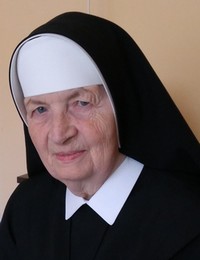
Sister Bonavita – Margita Brajerová
She was saved from the first attacks against religious orders by working at the hospital in Rožňava and graduating from medical school. In 1957, the security services interrogated her in connection with suspected anti-state activities, namely hiding a secret radio. The accusation was based on the unreliable testimony of a mentally ill patient who thought he had heard her listening to Vatican Radio. Sister Bonavita was not convicted, but instead dismissed and sent to a concentration monastery in the village of Číž to perform farm work with 80 other sisters from various orders.
Since 1962 she worked at the Institute of Social Care in Straník near Žilina, and since 1971 in Hronský Beňadik. Since 1990 she lived at a charity house in Vrícko. According to Matej Roľko, who followed her life story, Sister Bonavita’s legacy continues to be relevant: “So that the word ‘freedom’ is never to be confused with terms such as ‘egoism’ and ‘ruthlessness’.”
Sister Maria Bernadet - Aurélia Štefánia Pánčiová (1924 - 2015), Congregation of the Sisters of Mercy of St. Vincent - Satmárky
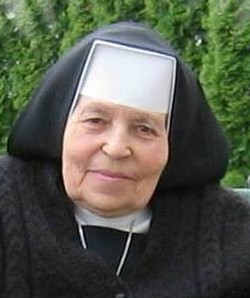
Sister Mária Bernadet – Aurélia Štefánia Pánčiová
She worked as a teacher in Pavlovce nad Uhom. Due to health problems, she underwent hip and knee surgery. In 1950, she was dismissed from education and interned at a concentration monastery in Rožňava. Subsequently, she was transported to Varnsdorf in Moravia. She secretly led the congregation’s novitiate until 1989. During 1958 – 1973 she officially worked as an accountant at the Charity Home in Dolný Smokovec, and then returned to Ružomberok.
During her stay at Martin’s Hospital in 1975, she began to consider the idea of founding the Immaculate Family to help the sick. The association, which was founded in the jubilee year of 1975 in Turice, currently operates abroad (e.g. Australia and Canada). In addition to spiritual support for the sick and abandoned, she was also visited prisoners. She wrote poems and published several books under the pseudonym Miriam Liptovská. She is often referred to as the ‘Slovak Mother Teresa’.
In 1991, President Václav Havel awarded her the Order of T.G. Masaryk 4th class, and in 1995 was voted Slovakia’s Person of the Year (based on a survey in Slovenka magazine).
Sister of Almira - Mária Straková (1923 - 2014), Congregation of the Sisters of Mercy of St. Vincent - Satmárky
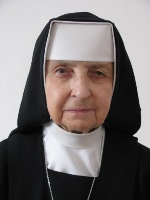
Sister Almíra – Mária Straková
One of the students found an illegal religious-themed text and reported the nuns to the state authorities. They were soon arrested and investigated on suspicion of inciting public outrage. From 3 June 1950 to 27 April 1951 she spent 11 months in pre-trial detention. She experienced the horrors of interrogation, but was eventually released.
She spent the next part of her life in Banská Štiavnica as a nurse, working with mentally disabled children. In 1981 she helped build a charity home for old and sick fellow-sisters in Vrícko, where she worked until her death on 18 November 2014.
In her recollections as recorded by H. Matláková, she mediated on the experience of imprisonment as follows: “The night-time interrogations were the worst. They let you fall asleep, and then immediately took you so that you’d be disorientated and tell them what they wanted to hear.”
Sister Zdenka - Cecília Schelingová (1916 - 1955), Congregation of the Merciful Sisters of St. Cross
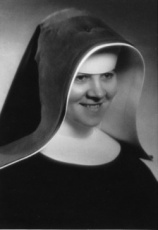
Sister Zdenka – Cecília Schelingová
She worked in the X-ray department at the State Hospital in Bratislava, and since 1941 as a nurse at the hospital in Humenné. Then from 1942 again in Bratislava at the State Hospital on Miczkiewiczova Street.
During the communist regime, she helped persecuted priests escape across the Iron Curtain, namely priest Štefan Koštial who was treated in hospital for his torture, and later others when she received information about the potential shooting of priests and seminarians (Titus Zeman, Štefan Sandtner, ThDr. Andrej Dermek, ThDr. Viliam Mitošinka, Justín Beňuška, and Pavol Pobiecky). On 17 June 1952, she was sentenced to 12 years in prison and 10 years without civil rights for alleged high treason.
Despite her cruel treatment, she did not betray those who had abused her. Her statement is well-known: “Forgiveness is the greatest thing in life.” She was released when seriously ill on 16 April 1955 so that she wouldn’t die in prison. She died on 31 July 1955.
John Paul II declared her blessed on 14 September 2003 in Bratislava–Petržalka during his third pastoral visit to Slovakia. She was the first blessed woman in the history of Slovakia.
Sister Mária Veronika - Etela Procházková (1922 - 2001), School Sisters de Notre Dame
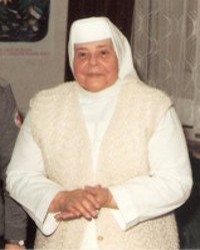
Sister Mária Veronika – Etela Procházková
She was born on 23 November 1922 in Nitra. After her parents’ death, she and her two siblings were put into an orphanage in Kláštor pod Znievom, where she also studied at the local grammar school. Other studies focused on pedagogical education were related to her joining the Congregation of School Sisters de Notre Dame. In 1945 she graduated from the Teacher’s Academy in Modra.
She worked as a teacher in Nové Mesto nad Váhom, and since 1947 in Liptovská Lužná. As a result of the communist regime, she was deprived of her teaching post and interned on the night of 28 August 1950 at the monastery in Beckov. In 1951 she was interned at a factory in northern Bohemia (Úpice town). Six years later, she worked at the Institute of Social Care for Adolescent Girls in Klentnice, and subsequently as a nurse in Vejprty and Turčianske Teplice. She partly gained pedagogical practice as an educator at the Institute of Social Care for the Mentally and Physically Handicapped in Bratislava.
She encouraged drawing and singing in all her workplaces. She also secretly prepared children and young people to receive sacraments. “It is happier to cry under the blows of the cross than to be the cause of others’ tears,” she wrote to her co-sister Maria Patricia Kosecová. Marek Nikolov wrote: “The truth is that also thanks to sr. M. Veronike Procházkova SSND, today the mojpribeh.sk portal exists.” She died on 17 May 2001 in Beckov.
Sister Stella - Rozália Danková (1920 - 2017), Society of Daughters of Christian Love of St. Vincent de Paul
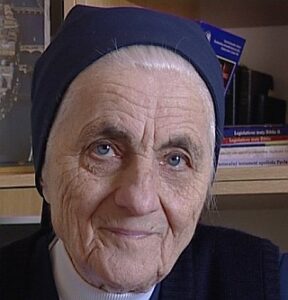
Sister Stella – Rozália Danková
Rozália Danková (religious name Sister Stella) was born on 26 April 1920 in Svätý Kríž nad Hronom. After graduation (1939), she joined the Society of Daughters of Christian Love of St. Vincent de Paul (Vincentians). She worked as a teacher at a burgher school in Nitra, and later in Zbehy.
After Operation R, she worked at Trenčín hospital until the forced internment of nuns/nurses in 1955. The internment began at dilapidated Smečno stately home. She worked at a retirement home. On 18 August 1958, she was detained and taken to the prison in Brno with three fellow sisters.
On 19 November 19 she was sentenced to 30 months in prison for “subverting the republic”. She was placed in an overcrowded prison in Pankrác along with prostitutes and murderers. She was held until the amnesty in 1960, and subsequently worked in charity homes in Bohemia.
During the Prague Spring, she travelled to France where worked in the maternity home of the Congregation in Paris until 1977, and subsequently as a nurse in Czechoslovakia. In 1983, she was again raided by the security forces and interned with fellow-sisters in Bílá Voda near Javorník.
After the Gentle Revolution, she returned to Nitra. A video recording of her testimony for the Nation’s Memory Institute can be viewed here.
Sister of Notburg - Eva Galbavá (1930), Society of Daughters of Christian Love of St. Vincent de Paul

Sister Notburga – Eva Galbavá
In August 1955, despite pressure from the regime, she refused to enter civilian life and was therefore sent to a concentration monastery in Belušské Slatiny. She was subsequently moved around to other monasteries: Podolínec, Močenok, Pezinok, Modra, and since 1974 again Pezinok. Since 2004 she lives in Belušské Slatiny in a community of Vincentian sisters.
Sister Pavla Eštočinová (1928 – 2009), Institute of the Blessed Virgin Mary
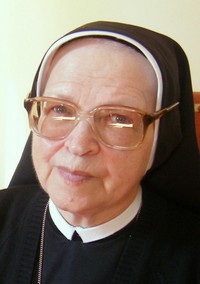
Sister Pavla Eštočinová
During Operation R in August 1950, she was sent to Spišská Sobota where she and her fellow sisters lived under trying conditions at a concentration monastery. Many sisters were hospitalized due to ill-treatment. Sister Pavla was later assigned to Ivanka pri Nitre.
A religious course during the Prague Spring enabled her to work as a teacher of religion in Prešov. During ‘normalization’ she could only teach religion if she renounced her devotion, which she refused and so was sent to Báč monastery. She devoted herself to the apostolate of youth, the organization of spiritual renewals and spiritual exercises, and was a novice master and leader of the postulate. She died on 15 September 2009 in Prešov.
Sister Viera – Mária Barteková (1921), School Sisters de Notre Dame
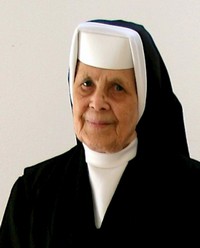
Sister Viera – Mária Barteková (foto: KVPZR)
As part of the crackdown on religious orders (1950 – Operation R), she was discharged from school service and moved to a concentration monastery in Kláštor pod Znievom. In 1951 she and fellow nuns were forcibly interned in Šumperk, and then in 1955 in Krásná Lípa where she worked in a factory. Since 1961, she worked at a social care institution for mentally disabled children in Kováčská. In 1981 she joined a Charity Home in Beckov.
REGIME REPRESENTATIVES
Teodor Baláž (1917 – 1994), Chief Official of the State Security Service
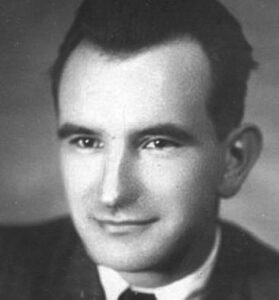
Teodor Baláž
Chief Official of the State Security Service in Slovakia. After graduating from school, he worked as a draughtsman at a cable factory in Bratislava. He was involved in illegal communist activities, and was in the Soviet Union during 1944 – 1945. He worked at the Interior Commission in internal political intelligence from 1945 to 1949. He later became the Deputy Head of the BA (State Security) Department of the Interior Commission, and from January 1949 was Head of the BAa (Internal State Security) Group. He also led the ‘ST Group’ that sought the Communist Party’s enemies within.
From 1 April 1950 he was promoted to Head of the BA Department of the Interior Commission. After the abolition of commanding units in Slovakia, he became Deputy Minister of National Security for General Josef Pavel. He was arrested in April 1951, accused of high treason and sabotage, and in 1953 convicted at a trial with Oskar Valášek, et al. and sentenced to 25 year´s imprisonment. He was released in 1960, and rehabilitated three years later.
Vladimír Clementis (1902 – 1952), politician, member of the ‘Church Six’
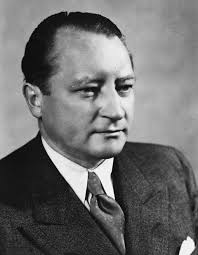
Vladimir Clementis
Communist politician, official, lawyer, publicist and diplomat. He joined the Communist Party in 1924 and a founder of the ‘Davist movement’. He was a member of the National Assembly from 1935 to 1939. In 1939 he emigrated to France and later to England. He criticized the Ribbentrop–Molotov pact, and on this basis was expelled from the Communist Party in 1940. From 1941 to 1945 he worked as a journalist and presenter in London on radio broadcasts for Bohemia and Slovakia. After self-criticism he was re-admitted to the Communist Party in 1945, and became State Secretary at the Ministry of Foreign Affairs.
From 1948 to 1950 he was Minister of Foreign Affairs. In 1949 he became a member of the Central Committee of the Communist Party and the ‘Church Six’, which was responsible for taking anti-church measures. In March 1950, he was subjected to party criticism, accused of ‘bourgeois nationalism’, and dismissed as Minister. He was arrested in January 1951 and charged with anti-state activities. In the show trial with Rudolf Slánský, et al. he was sentenced to death and executed on 3 December 1952. He was rehabilitated in 1963.
Alexej Čepička (1910 – 1990), politician, Chairman of the State Office for Ecclesiastical Affairs
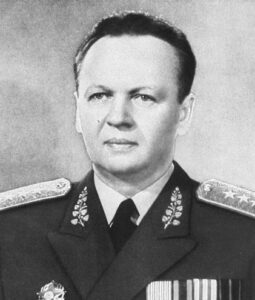
Alexej Čepička
Czech communist politician and official. He graduated from the Faculty of Law of Charles University in Prague, and worked in advocacy in Ostrava from 1937–1941. He joined the Communist Party in 1929. In 1942 he was arrested and imprisoned at the Nazi concentration camps Auschwitz and Buchenwald until the war ended. Then he started a staggering career that was accelerated by his marriage to the daughter of Czechoslovak communists leader Klement Gottwald.
He was a member of the National Assembly from 1946 to 1960. From December 1947 he was Minister of Internal Trade, and in February 1948 became the Minister of Justice until April 1950. He also held other key positions such as Secretary General of the Action Committee of the National Front, and Chairman of the State Office for Ecclesiastical Affairs. He led the ‘Church Six’ of the Central Committee of the Communist Party, and was a member of its security commission.
From April 1950 to April1956 he was Minister of National Defense and thus appointed to the rank of army general. Čepička and Slánský were the closest fellow workers of Gottwald. Yet after Gottwald’s death in 1953, Čepička’s political influence began to wane – and due to his past and attitude towards the new party leadership, he became surplus and in 1956 was removed from ministerial office. He was chairman of the State Office for Inventions and Standardization for a short period, but in 1963 was expelled from the Communist Party.
Zdeněk Fierlinger (1891 – 1976), politician, member of the ‘Church Six’
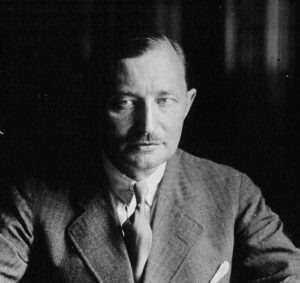
Zdeněk Fierlinger
Czech politician and diplomat. During World War I he joined the Czechoslovak legions in Russia and after the war was an ambassador in several countries. In 1924 he joined the Czechoslovak Social Democratic Party. From 1937 to 1945 he was an envoy and then ambassador to the USSR. He was the Prime Minister of Czechoslovakia from 1945 to 1946, and from 1946 to 1947 chairman of Czechoslovak Social Democracy (ČSSD).
He was the main initiator of the merger between the ČSSD and the Communist Party in February 1948, becoming a Central Committee of the Communist Party member in the same year. From 1948 to 1953 he was Deputy Prime Minister and from 1953 to 1964 Chairman of the National Assembly. He was also a member of the ‘Church Six’, which was responsible for taking anti-church measures. He was also Minister in charge of the management of the State Office for Ecclesiastical Affairs. He was a member of the Presidency of the Central Committee of the Communist Party until 1966.
Jiří Hendrych (1913 – 1979), politician, member of the ‘Church Six’
Czech communist politician, official and journalist. Graduate of grammar school, member of the Communist Party since 1933. During the Protectorate of Bohemia and Moravia, he was a worker and became involved in illegal communist activities. He was arrested in 1941 and interned at Mauthausen concentration camp until the end of the war. After the restoration of Czechoslovakia, he worked at the Secretariat of the Communist Party, first as the Secretary of Slánský, and then in the cultural and promotional department.
From 1946 he was a member of the Central Committee of the Communist Party, since 1948 also a member of the National Assembly, and later also a member of the ‘Church Six’, which was responsible for taking anti-church measures. His political downfall followed the arrest and conviction of Slánský. He was rescued by Novotný, who secured him the position of Secretary of the Regional Committee of the Communist Party in České Budějovice. He returned to Prague in 1954 and became Secretary of the Central Committee of the Communist Party, and from 1958 also a member of the Political Bureau of the Central Committee of the Communist Party. In fact, after Novotný he was the second-highest figure in the party. After Novotný’s dismissal as First secretary of the Central Committee of the Communist Party in January 1968, Hendrych’s fall also followed. He lived the remainder of his life in seclusion.
Ladislav Holdoš (1911 – 1988), Commissioner-Chairman of the Slovak Office for Ecclesiastical Affairs
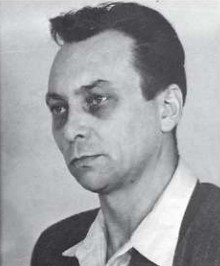
Ladislav Holdoš
Slovak communist politician and official who joined the Communist Party in 1935. From 1936 he fought in the Spanish Civil War on the Republican side. During World War II, he served as a soldier in the foreign Czechoslovak army in France, and after France fell he was active in the illegal anti-fascist resistance movement. He was subsequently arrested and interned at Buchenwald concentration camp. From 1945 he worked in the Czechoslovak Republic as a communist official. In 1948 he became Chairman of the Defense Commission of the Communist Party of Slovakia, and General Secretary of the Slovak National Front.
He was Commissioner-Chairman of the Slovak Office for Ecclesiastical Affairs in 1950. A year later, he was arrested and expelled from the Communist Party. During the trial with other ‘bourgeois nationalists’ (Husák, et al.) in 1954 he was sentenced to 13 years’ imprisonment. He was released in 1957 and after receiving an amnesty in 1963 regained his Communist Party membership. Yet in 1970 he was expelled once again and became a dissident.
Gustáv Husák (1913 – 1991), politician, Chairman of the Slovak Office for Ecclesiastical Affairs
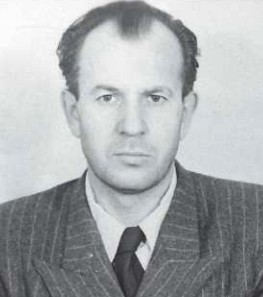
Gustáv Husák
Slovak communist politician, lawyer and statesman. He came from a poor Slovak peasant family. Communist Party member since 1933. From August 1943 he was a representative of the fifth illegal leadership of the Communist Party of Slovakia. During the Slovak National Uprising, he was Vice-Chairman of the Slovak National Council (SNR), Commissioner for Internal Affairs, and was a key figure in the Uprising. In the renewed Czechoslovakia he was the Chairman of the Board of Commissioners (1946 – 1950) and Chairman of the Slovak Office for Ecclesiastical Affairs (1949 – 1951).
He actively participated in the establishment of a totalitarian regime and political persecution. He also took part in the preparation of ‘Action K’ but not its implementation because in the spring of 1950 he was accused – as part of an intra-party power struggle – of ‘bourgeois nationalism’ and removed as Chairman of the Board of Commissioners and lost membership of the Central Committee of the Communist Party. He was arrested in February 1951, deprived of his remaining official functions, and expelled from the Communist Party. At a show trial he was sentenced to life imprisonment in April 1954. Given an amnesty, Gustav Husák was released in May 1960. In 1963 he was rehabilitated and re-admitted to the Communist Party. Thus began his second rise to power, especially in the 1960s when he gathered representatives of the Bratislava intelligentsia around him and was a central Bratislava pre-spring figure. Husák contributed to the revival of the national emancipation process with the demand for a fairer position of Slovakia in the common state, and as such was a leading figure in the reform process in Slovakia in 1968. After Alexander Dubček became leader of the Communist Party, Husák was appointed Deputy Prime Minister of the Czechoslovak Socialist Republic in April 1968.
After the invasion by Warsaw Pact troops, he attended Moscow talks where his stance changed. After returning to Bratislava, he was elected First Secretary of the Central Committee of the Communist Party of Slovakia at an extraordinary congress of the party. Between September 1968 and March 1969, Husák consistently pursued a policy of normalization. From 17 April 1969 to 17 December 1987 was First (later General) Secretary of the Central Committee of the Communist Party. He replaced Ludvík Svoboda as president in May 1975, and in the 1970s and 1980s became a symbol of normalization. After the fall of the communist regime in 1989, he abdicated as the President of the Republic. He lived in seclusion until his death.
Václav Kopecký (1897 – 1961), Secretary of Information, member of the ‘Church Six’
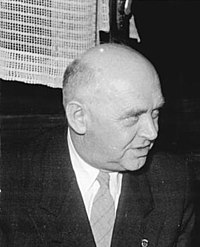
Václav Kopecký
Czech communist politician, official and journalist. A graduate of grammar school, member of the Communist Party since 1921. From 1925 he worked as a journalist for the Communist Party, especially at Rudé právo (from 1933 as editor-in-chief). From 1929 he was a member of the Central Committee of the Communist Party. Between 1931 – 1938 he was a member of the Politburo of the Central Committee of the Communist Party, and from 1929 to 1938 a member of the National Assembly. He gradually built the position of chief ideologue of the Communist Party.
In the autumn of 1938, he went into Soviet exile and became a member of the Moscow leadership of the Communist Party. After 1945, he became a deputy and also member of the Communist Party leadership – from February 1948 he was a member of the presidency of the Central Action Committee of the National Front. He was a member of the political secretariat of the Central Committee of the Communist Party from 1951.
From 1945 to 1953, he headed the Department of Information and, thanks to this position, played an important role in promoting the communist monopoly of power in Czechoslovakia. He was also a member of the ‘Church Six’, which was responsible for taking anti-church measures. In 1953 he became Minister of Culture and from 1954 Deputy Prime Minister. In 1960 he was appointed Vice-chairman of the Government of the Czechoslovak Socialist Republic.
Ladislav Novomeský (1904 – 1976), commissioner of education and enlightenment
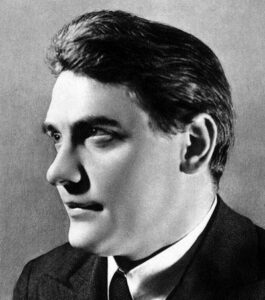
Ladislav Novomeský
Slovak communist official, politician, poet and journalist. He was born into the family of a Slovak tailor. He was a founder of the left-wing literary-art magazine and association DAV. Member of the Communist Party of Czechoslovakia since 1925. From 1943, he was a representative of the fifth illegal leadership of the Communist Party of Slovakia, and participated in preparations and course of the Uprising. After 1945, he became a member of the National Assembly, the Chairman of Matica slovenská and Chairman of the Association of the Slovak Writers.
He was the commissioner of education and enlightenment from 1945 to 1950. As part of party criticism in the spring of 1950, he was accused of ‘bourgeois nationalism’ and removed from office as commissioner. He was arrested in February 1951, lost his remaining professional functions, and expelled from the Communist Party. After a contrived lawsuit with Husák et al., he was sentenced in April 1954 to 10 years in prison. At the end of 1955, the highest party bodies decided on his conditional released and in following years lived in Prague.
He returned to Slovakia and was rehabilitated in 1963. In 1968 he became a member of the Central Committee of the KSS, and again Chairman of Matica slovenská. In 1971 he resigned from all positions, and lived in seclusion until his death.
Daniel Okáli (1903 – 1987), commissioner of the interior
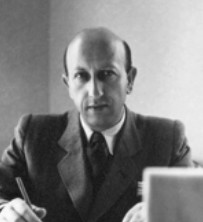
Daniel Okáli
Communist official, politician and writer. He was born into the family of a tradesman and businessman. He was a founder of the left-wing literary-art magazine and association DAV. He joined the Communist Party at the end of World War II. He was Presidential Chief of the Interior Commission from 1945 to 1946. During 1946–1948 he was a government plenipotentiary for the exchange of dwellers with Hungary and the head of the Czechoslovak Resettlement Commission.
During 1948–1951 as commissioner of the interior he was directly involved in anti-church interventions. He was arrested in February 1951, tried with G. Husák et al., and sentenced to 18 years in prison. He was released in 1960 and rehabilitated three years later. He never returned to politics and devoted himself to literary-historical and critical journalism. He worked at the Institute of Slovak Literature of the Slovak Academy of Sciences (SAV) and the Literary-scientific Institute SAV.
Viktor Sedmík (1916 – 1970), Chief Official of State Security
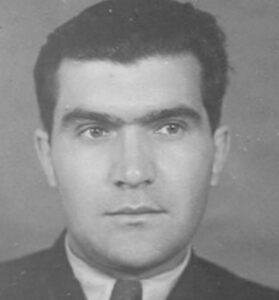
Viktor Sedmík
The Chief Official of State Security (ŠtB) in Slovakia. A graduate of the Teacher’s Institute, during 1937–1943 he worked as a professional officer. In February 1943 he joined the General Command of Gendarmerie where he held important positions. From February 1945 he worked in the security apparatus organized by the National Security (NB) in southern Slovakia, later an aide to the commander-in-chief of the NB. From the end of 1945, he was Deputy Head of the Department of State Security and Political Intelligence of the Interior Commission and also Head of II (intelligence) section of the department. From January 1949 to March 1950 he led the BA Department of the Interior Commission.
From April 1950 he worked as the head of the economic and control department of the Transport Commission. He worked from the end of June at the State Pedagogical Institute in Bratislava, later as a teacher. At the beginning of January 1952, he was arrested and convicted in a trial with Oskar Valášek, et al. and sentenced to 21 years in prison. He was released in 1959 and rehabilitated four years later.
Rudolf Slánský (1901 – 1952), communist politician and official
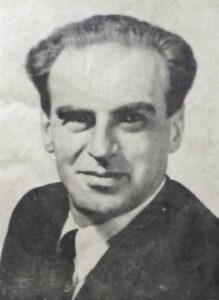
Rudolf Slánský
Czech communist politician and official. He graduated from the University of Business in Prague. He was a founding member of the Communist Party. Until 1924, he worked as the head of the foreign section of Rudé Právo. For the next three years he held various party positions in Ostrava. At the 5th Congress of the Communist Party, he was elected a member of its Politburo and Central Committee. During Gottwald’s forced exile in Moscow, he de facto ran the Communist Party together with Ján Šverma. During 1938-1945, he served in the Moscow exiled leadership of the Communist Party. In the autumn of 1944, he was sent to Slovakia where he served on the main staff of the partisan movement.
After the war he became Secretary General of the Communist Party, a member of its presidency, and a member of the National Assembly – in fact after Gottwald he was the second-highest figure in the party. He played a decisive role in the communist takeover in February 1948, and until 1951 was a key figure in organizing political trials. But he himself was to fall victim to such trials. State security, led by Soviet security advisers, devised a ‘conspiracy center’ in the Communist Party which Slánský led, who was then removed as Secretary General of the Communist Party in September 1951 after being accused of serious political misdemeanors. However, he continued to serve as Deputy Prime Minister of the Czechoslovak government. He was arrested in November 1951 and investigated for a year.
In November 1952, together with ten other former communist officials, he was sentenced to death in a contrived show trial and executed on 3 December in Prague. In 1963 he was judicially and civilly rehabilitated. He did not receive party rehabilitation until 1968.
Viliam Široký (1905 – 1971), politician and official
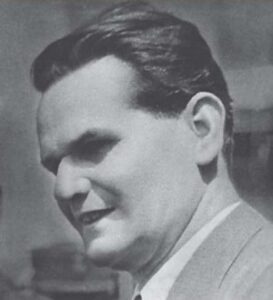
Viliam Široký
Slovak communist politician and official. He was born into a family of railway workers where he continued his father’s career. In 1921 he joined the Communist Party, and from 1923 to 1928 was Secretary of the Regional Committee of the Communist Party in Bratislava. He was considered a close collaborator of Gottwald and a representative of Slovak communists in the Communist Party’s leadership. During 1935–1938 he was the Secretary of the Central Committee of the Communist Party, and also a member of the National Assembly (NZ). He also worked in Comintern and collaborated with Soviet intelligence services.
In 1938 he became the Chairman of the Regional Leadership of the Communist Party in Slovakia, but at the end of the year emigrated to the Soviet Union. He also worked briefly in Paris, but returned to Moscow in 1940. The following year he was sent to Slovakia with instructions from the Moscow Communist Party leadership, but was soon arrested and sentenced to 14 years in prison. He was released in February 1945 moved to territory controlled by the Red Army, and from there to Moscow.
After 1945 he became KSS Chairman, a member of the Presidium of the Central Committee of the Communist Party, the Deputy Prime Minister, Minister of Foreign Affairs from 1950 to 1953, and then Prime Minister of the Czechoslovak government from 1953 to 1963. Until 1966 he was a member of the Central Committee of the Communist Party. After February 1948, he was the top dog in Slovakia, one of the main engineers of the campaign against ‘bourgeois nationalists’, and a member of the ‘Church Six’, which was responsible for taking anti-church measures. After a revision of political trials of former communist functionaries, in 1963 he was removed as Prime Minister and member of the Presidium of the Central Committee of the Communist Party. In 1968, his membership of the Communist Party was suspended and only returned shortly before his death.

Nation's Memory Institute
Miletičova 19
P. O. Box 29
820 18 Bratislava 218
© Nation's Memory Institute 2020 – 2024, all rights reserved | Sitemap
